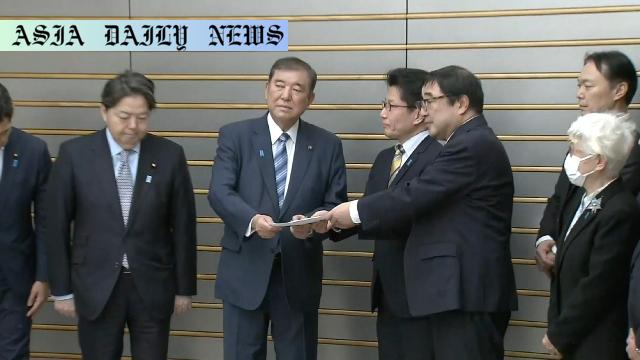Abduction: Prime Minister Ishiba Shigeru has vowed to explore all possibilities to resolve the North Korea abduction issue.
Abduction issue persists with Japan recognizing 17 cases by North Korea.
PM Ishiba pledged to use all measures for abductees’ return.
Yokota families criticize delays and plead for action.
5 abductees returned since 2002; 12 remain unaccounted for.

Introduction
The unresolved abduction of Japanese nationals by North Korea continues to be a deeply emotive and pressing issue in Japan. Prime Minister Ishiba Shigeru has recently pledged to exhaust all avenues in addressing this crisis, after meeting with the families of the victims. Recognizing the emotional toil on these families, Ishiba emphasized the government’s commitment to ensuring the return of abducted citizens.
The Historical Context
The abduction issue dates back to the 1970s and 1980s when North Korea admitted to the kidnapping of Japanese citizens, with 17 cases officially recognized by Japan. These citizens, including children like Yokota Megumi, were abducted to serve various roles in North Korea, from teaching Japanese culture and language to other covert roles. Out of the 17 cases, five abductees returned to Japan in 2002 following diplomacy led by then Prime Minister Junichiro Koizumi. Unfortunately, 12 abductees remain unaccounted for, with families continuing to seek answers.
Prime Minister Ishiba’s Renewed Commitment
During his meeting with the abductees’ families on Thursday, Prime Minister Ishiba accepted an action plan created by the bereaved group. The plan emphasizes increased focus on diplomatic engagement and the need for concrete actions to engage North Korea. The Prime Minister reiterated that he considers North Korea’s abductions of Japanese citizens a direct violation of national sovereignty and grossly unacceptable. He pointed to recent discussions with US President Donald Trump, who has expressed comprehensive support for Japan’s efforts in resolving the crisis. Ishiba sought to reassure families of the government’s unwavering commitment to the issue.
The Families’ Perspective
Yokota Takuya, the brother of abductee Yokota Megumi, voiced his dissatisfaction, questioning the government’s delays and perceived inaction. He expressed frustration over the emotional suffering endured by families who await reunions with their loved ones. Yokota Sakie, the mother of Yokota Megumi, revealed the challenges she has faced in her nearly 50-year-long campaign for the abductees’ return. Despite the difficult diplomatic conditions posed by North Korea, she remains hopeful that her daughter and others may one day return to Japanese soil.
The Path to Diplomacy and Resolution
Efforts to resolve this issue remain a diplomatic challenge. Abductees’ families have urged the Japanese government not only to intensify its bilateral negotiations with North Korea but also to leverage its partnerships with global allies like the United States for additional pressure. A proposed Japan-North Korea summit could provide a crucial platform for advancing these discussions, but the situation remains delicate amidst tense international relations on other fronts, including nuclear and security issues.
The Long Road Ahead
Japan’s recognition of 17 abduction cases underscores the gravity of the issue, with each case entwined in a narrative of heartbreak, loss, and an enduring yearning for justice. Indeed, the aspiration to bring all 12 unaccounted abductees safely back to Japan is a broader symbol of Japan’s commitment to protecting the rights of its citizens abroad. However, tangible progress remains limited, and Japan, under Ishiba’s leadership, faces an uphill battle in resolving this issue against the backdrop of complex geopolitical dynamics.
Conclusion
As the families of the abductees continue their decades-long struggle, the Japanese government must turn its renewed promises into meaningful actions. Whether through increased diplomatic interventions, global collaborations, or leveraging historical precedents like the 2002 summit, Japan must uphold its sovereignty and the rights of its people. The emotional plea of the abductees’ families reflects not just a desire for justice but also for closure and peace—an aspiration that resonates across national and international boundaries.



Commentary
An Unresolved Humanitarian Crisis
The abduction of Japanese citizens by North Korea remains one of the most heartbreaking chapters in Japan’s recent history. For decades, the families of abductees have lived in agonizing uncertainty, torn between hope and despair. The passing of individuals like Arimoto Akihiro without a reunion with his abducted daughter, Keiko, is a stark reminder of the urgency of this issue. Every passing day without resolution translates to more suffering for the families and lost opportunities for reunions.
Politicizing a Human Cause
While progress has been made in the past, such as the return of five abductees in 2002, the lack of momentum since then is frustrating. Diplomatic efforts have often been hindered by the larger geopolitical challenges with North Korea, particularly concerning its nuclear program and strained international relations. Yet, the abduction issue is fundamentally a humanitarian one and must transcend political maneuvering. Leaders like Ishiba Shigeru have a unique opportunity to prioritize this pressing concern.
Need for Swift and Decisive Action
Prime Minister Ishiba’s commitment to exploring ‘all possibilities’ offers a glimmer of hope. However, families like the Yokotas are justified in expressing their skepticism, given past unkept promises. Swift, decisive action—be it through sustained bilateral negotiations or leveraging alliances—will be crucial in proving that the Japanese government is earnest in its determination to resolve this crisis. For the families, time is another adversary, and the government’s actions need to match the urgency of their plight.
Conclusion
Ultimately, the push to resolve North Korea’s abductions is not just about the 12 unaccounted abductees but also about reaffirming Japan’s sovereignty and its dedication to the rights and safety of its citizens. The voices of families echo the collective need for action and demand accountability from those in power. Japan’s government must now rise above rhetoric and make tangible steps towards healing a decades-old scar on its national conscience.